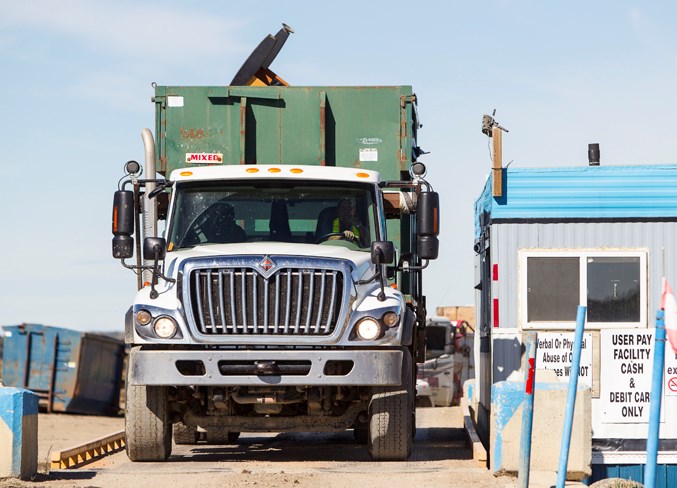Mountain View Regional Waste Management Commission says it is currently not sustainable, forcing member municipalities to begin making decisions about its future.
The commission is projecting a $364,000 deficit for 2018, following at least two years of running deficits, according to documentation being used by member municipalities to make budget decisions.
The waste commission finance committee, commission administration and a financial contractor concluded in a recent review “that the commission is not sustainable as it has currently been operating.”
The councils of three member municipalities -- Sundre, Carstairs and Cremona -- have made motions to work towards the total sale of all the commission’s assets and liabilities, including the landfill near Didsbury.
The option was one of five presented to council members of all member municipalities last month during a Municipal Area Partnership meeting where the review was discussed.
Councils were told selling the assets is not a quick option and a sustainable operating model still needs to be considered for the 2019 budget.
The same was said about the option to temporarily close the landfill.
Council members were told the fastest and easiest model to implement in the 2019 budget is the option to begin accepting waste from outside the municipalities’ boundaries and begin charging a fee for service for the landfill.
Councils of all six member municipalities, including Olds, Didsbury and Mountain View County, have now made motions to amend their membership agreement to allow third party waste to be disposed of at their Didbsury-area landfill.
All the councils discussed the options in camera and not in open council.
Commission chair Mary Anne Overwater said adding extra tonnage could help boost revenues.
"We're looking at bringing in an extra 5,000 tonnes in order to help with the revenue. The people we have in place right now are looking into that and hopefully we can maybe get some of that new waste into the facility by the end of the year."
Overwater said that the waste they would bring in from outside the county wouldn't be too hard on the landfill.
"Five thousand tonnes probably only depletes the lifespan of the whole landfill by about a year in the scheme of things," she said. "We probably have about 23 to 24 years of lifespan left at the facility. So if we bring in 5,000 tonnes we don't need to bring in extra equipment or hire more staff. We can handle that extra 5,000 tonnes without increasing much expense."
Overwater said that those bringing in outside waste would pay the same as local members ($115/tonne at the scale).
The amount of waste being brought into the landfill is part of the commission’s financial woes, the review found.
“The commission has under-performed in 2016 and 2017 for the following reasons,” the review noted, pointing to less tonnage realized than budgeted, higher expenses than budgeted and unbudgeted items drawing on cash.
“As of Dec. 31, 2017 the commission had sufficient cash flow to cover its restricted reserves, however this will not be the case for 2018,” the review stated.
According to meeting minutes, the commission has approved moving funds out of reserve accounts into the general account to pay Alberta Capital Finance Authority obligations for things like equipment and bins.
The recently conducted review found that “reserve budgeting and movements are not as per policy.”
It also identified additional issues including that the commission has historically relied on one-off revenue streams -- either fees to municipalities or additional hydrocarbon soil.
The 2018 projected deficit is a combination of an expected $160,000 less tipping fee revenue than budgeted and $80,000 less in hydrocarbon contaminated soil revenue than budgeted. On the expense side, the review projected operating expenses and capital lease payments running over budget by about $124,000.
The review notes numbers and projections are approximate.
Councils were asked to have their decisions on the options communicated to the commission by July 9 in order for the commission to be able to continue to work towards the 2019 budget and fee schedule.
Under the current membership agreement, the review stated the commission will have to exercise its power to charge municipalities a fee for service for the landfill in the 2019 budget.
Several municipalities' motions also made reference to actions such as working towards having an independent review of operations and financials, supporting new and future innovations in waste management and strengthening language in the member agreement pertaining to recycling responsibilities.



